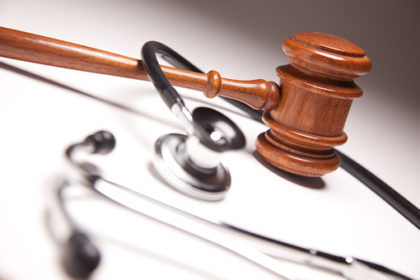
Medical Negligence – Establishing a Case
Listen to John’s discussion:
[soundcloud id=’177480820′]What is the first thing that someone who thinks that they might have a medical negligence case should do?
They should contact us as soon as possible. This is important as you have two years from the incident or from the date of knowledge to bring a case.
How would someone know if there might be an act of Medical Negligence?
It is very difficult to establish at an early stage.It’s not common for hospitals to inform
patients when an error has occurred so typically a patient or relative becomes suspicious of
an error, an uninformed opinion is formed we are then instructed to investigate.
What do you do when someone contacts you?
Medical negligence claims, in a similar way to personal injury claims, are made up of a series
of hurdles. If you do not clear the first hurdle you cannot move on to the next.
We take a very detailed statement from the Client and we then proceed about taking up their medical records and getting a supportive medical report from a UK expert.
How do you get their medical records and how long does this take?
We get the Client’s written authority and we make applications Under the Data Protection or Under the Freedom of Information Acts.
The time periods differ and whilst there is a time period to which they must adhere to I typically find that it takes approx. 2- 3 months to get records.
Are these types of cases very difficult?
Unlike with other types of personal injuries, medical negligence cases are very complex.
In a lot of cases, the person is sick before they ever get to hospital, or they are suffering from
a serious underlying condition, such as cancer and one of the tasks which the Solicitor faces
is to distinguish what the outcome would have been but for the negligent act or omission
which took place.
Inevitably, the Defendants will argue that the illness or disease that the person had when they
submitted themselves for treatment was the determining factor in the final outcome or, in the
context for instance of a surgical treatment, that the injury complained of is within the realm of
acceptable error :“ a recognised complication”.
Another difficulty is the lack of knowledge: when somebody gets injured in a factory, or is in
an accident on the road, what led to the event is rarely in dispute. However, in a medical
context, the background of the facts can be so vast and complex, that very often it is difficult
to understand what happened.
It is a fact that things do go wrong with surgery and there may not necessarily be
negligence – how do the Courts decide what is and what is not negligence?
Medical Negligence is essentially an act or omission by a health care professional which is
below the accepted standard of care and which results in injury or death to a patient.
Interestingly, before the 1950s there was no reported case of medical negligence in Ireland.
In fact, until 1989 the number of cases was minimal.
In 1989 the case of Dunne v The National Maternity Hospital [1989] Irish Reports 91 came
before the Supreme Court and remains to be the influential case in medical negligence to
the present day. The facts of this case was that only one heartbeat was monitored during
pregnancy, despite the fact that the mother was pregnant with twins; this led to one twin
being delivered with severe brain damage, and the other being delivered dead.
These principles are very lengthy and too lengthy to discuss here but in summary you have
to prove that the care you received fell below medically acceptable standards. Acceptable
General and approved practice’ need not be universal but must be approved of and adhered
to by a substantial number of reputable practitioners holding the relevant specialist or
general qualifications.
What types of cases do you come across?
Medical Negligence can happen because of:
- Diagnosis – i.e. misdiagnosis or delayed diagnosis;
- Treatment – i.e. errors in the medical treatment such as incorrect medication, surgical
errors, exposure to infection (MRSA etc.) or;
During the last 30 years the office has probably dealt with most types of medical negligence.
We have dealt with a broad range of medical negligence cases over the years. We have
represented clients in the areas of cancer misdiagnosis, orthopaedic and surgical negligence,
failure to diagnose, cerebral palsy and neonatal claims, amongst others.
We are currently representing a significant number of people who have been affected by the DePuy hip implant recall , symphysiotomies amnd narolepsy as a result of the pandemerix vaccine.

